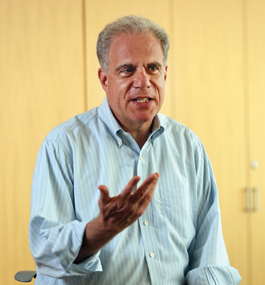The Brandeis Questionnaire
Michael Horowitz ’84

Mike Lovett
Michael Horowitz ’84
Michael Horowitz ’84, inspector general of the U.S. Department of Justice, jokes that when he goes for a sandwich, people start leaving the office lunchroom.
The director of the office charged with detecting and deterring waste, fraud, abuse and misconduct in Justice Department programs or committed by Justice Department employees knows his colleagues see him as the watchdog in chief. But his is a critical role, one he’s held during the Obama, Trump and Biden administrations.
Horowitz’s office, staffed by more than 500 special agents, auditors, inspectors, attorneys and support personnel nationwide, seemed to enjoy an especially high profile this summer. Over the span of just a few weeks, it said it would investigate disclosures that, during the Trump administration, the Justice Department subpoenaed Apple for metadata on members of Congress and seized journalists’ phone records to probe leaks of classified information; released a report that detailed the U.S. Marshals Service’s shortcomings in its protection of federal judges; issued a report, in the wake of the George Floyd murder, on the Justice Department’s need to implement body-camera policies for its federal law enforcers; and came down hard on the FBI’s failure to act with seriousness and urgency during its inquiry into physician Larry Nassar’s sexual abuse of young female gymnasts.
As a sign of his status among his IG peers, Horowitz from 2015-20 was elected to serve as chair of the Council of the Inspectors General on Integrity and Efficiency, an organization composed of all 75 federal inspectors general.
After graduating magna cum laude from Harvard Law School, Horowitz, a New York native, was an assistant U.S. attorney for the Southern District of New York for eight years, then moved to the Department of Justice’s Criminal Division in Washington, D.C., for three years, serving first as a deputy assistant attorney general and then as chief of staff. From 2002-12, he was a partner at Cadwalader, Wickersham & Taft, focusing on white-collar defense, internal investigations and regulatory compliance. He took over as inspector general at the Justice Department in April 2012 following his confirmation by the U.S. Senate.
In June, for Brandeis’ Alumni Weekend, Horowitz and journalist Bob Woodward participated in an online discussion about truth, oversight and accountability in post-Trump America. Horowitz explained he advises his staff to drop their preconceptions and follow a simple guidepost in their investigations. “It’s where do the facts lead you,” he said, “because if you stick to that, certainly in our jobs, you’ll get it right.”
His Brandeis education, and its emphasis on rigorous, respectful debate and careful listening proved formative in how he approaches his work. “I often say, ‘Truth, even unto its innermost parts,’” Horowitz said during the webcast. “I have a pretty good feel for that.”
What was your idea of perfect happiness when you were at Brandeis?
Playing intramural basketball and, when spring finally arrived, playing softball with friends on Chapels Field.
Who was your favorite Brandeis professor?
In my major, economics, it was Barney Schwalberg and Robert Lurie, who was my thesis adviser. I also had lots of outstanding non-econ professors; my favorite was John Bush Jones, who taught a great class on American musicals.
Where did you usually spend Saturday night?
It was always fun to go to Boston’s North End or Faneuil Hall, or Harvard Square.
If you could be any other Brandeisian, who would you be?
Well, Louis Brandeis was known as the people’s lawyer. I quote him regularly: “Sunlight is said to be the best of disinfectants.” Though he never went to Brandeis, isn’t he the very definition of a Brandeisian?
What is the most important value you learned at Brandeis?
The importance of rigorous analysis and research — there’s no substitute for facts.
What three words of advice would you give to current Brandeis students?
Be academically curious.
What was the most important shortcut you learned in college?
How to read, synthesize and comprehend large amounts of information in a reasonable period of time.
Which talent did Brandeis help you develop most?
My analytical writing abilities, which I use every day in my job.
If you could go back to college, what would you do differently?
Live in the Castle.
What would your friends say is your greatest strength?
My jump shot? Nah, my multitasking ability.
What would your friends say is your greatest weakness?
My jump shot. And being a control freak.
What is your blind spot?
My occasional lack of patience.
What movie changed your life?
I’m a big movie fan, so it’s hard to pick just one. But as a kid, I loved all five “Planet of the Apes” movies, “Serpico,” “The Sting” and “Dog Day Afternoon.”
Which possession do you most like to look at?
My baseball card and memorabilia collection.
Whom would you like to sing a duet with?
I have no singing ability, so I’d feel sorry for anyone who sang a duet with me. But it would be awfully fun to sing one with Bruce Springsteen.
Which bad break was your biggest blessing?
Getting rejected by Tufts. Brandeis and Tufts were my first choices, so getting rejected by Tufts made my decision easy and turned out to be a huge blessing.
If you could climb into a time machine, whom would you like to hang out with?
My grandparents and great-grandparents in Ukraine and Poland. My grandparents left everything behind to come to the United States, and the only one who was still alive when I was born passed away when I was 8.
On your deathbed, what will you be most grateful for?
My family and my 20-plus years of government service.
